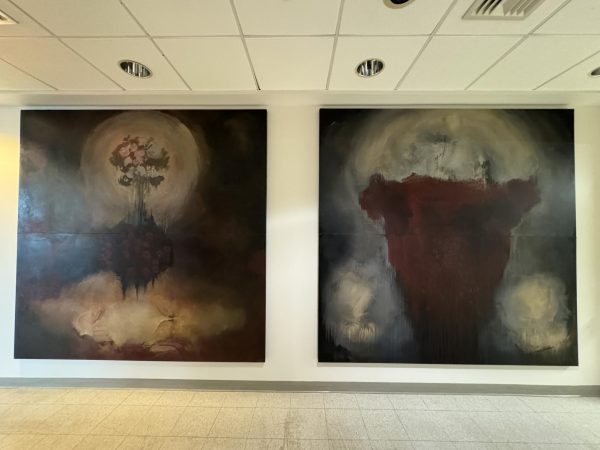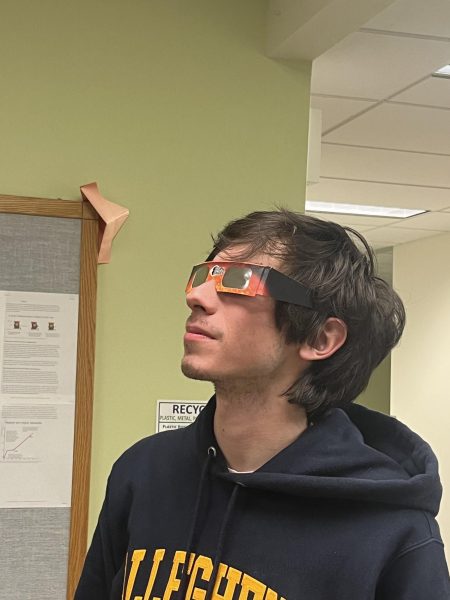ES class spurs sustainable changes on campus
At move-in on Aug. 22 every new freshmen received a stainless steel, Bisphenol A free water bottle as a result of work done by the Fall 2014 Environmental Science 210 class. The class conducted a survey on the prevalence of bottled water on campus and investigated reasons for bottled water usage and possible sustainable alternatives.
Diana Armas, ’17, who took the class said they got more than 600 survey responses which represented more than 25 percent of the student body.
“It was good to see what we’re finding actually reflected current classes,” said Armas.
According to the results of the survey, the majority of students on campus drink some form of tap or filtered water, however 25 percent still rely on bottled water. The survey showed that most of the 25 percent who do drink bottled water were freshmen. Forty percent of all freshmen drink bottled water whereas only 10 percent of seniors do.
The survey indicated that the main reason students drink bottled water is due to its convenience, with taste and water safety being the following two biggest factors. Forty percent of students were unsure about the safety of Meadville tap water and 21.2 percent said they drink bottled water because they prefer the taste.
The class is taught and advised by assistant professors of environmental science Brittany Davis and Beth Choate. Davis said tap water is more regulated than bottled water and therefore can often be safer. The Environmental Protection Agency, who monitor municipal water supplies, has very high standards and requires much more testing than the Food and Drug Administration, who regulate bottled water.
“They have found things like arsenic in bottled water because they [the FDA] don’t actually have to test it. Whereas a municipal water supply like Meadville’s…is tested regularly. And if there is a problem in the supply they have to shut it down and tell everyone not to use it, and supply you with bottled water in the interim,” said Davis.
After students in the ES210 class collected and analyzed the results of their survey they also conducted chemical analysis testing on Meadville tap water and completed blind taste tests of water samples gathered from all over campus. Results from the taste test conclusively indicated a strong dislike of water from Steffee Hall of Life Sciences, however the chemical testing showed the only difference in water there was a slight increase in iron levels. The chemical analyses showed that there are no significant abnormalities in the Meadville area tap water that would make it unsafe.
The results from the chemical analysis and taste testing influenced the placement of 11 new water refill stations that will be installed throughout the Fall 2015 semester. The first will be placed in the Library early next week.
These refill stations are what students voted for the 2014 Energy Challenge savings to be spent on now that all 24 solar panels on Steffee have been installed. The placement of these water refill stations was determined by the chemical analyses, taste testing, and observational studies done by ES210.
As part of their research the class studied the four water refill stations already on campus, daily checking the counters on two of them, as well as observing how often each station was used.
Sustainability Coordinator Kelly Boulton said the results of the research helped them think about where they should put the stations based on where students would have access to them. It also helped identify buildings that had notoriously bad water, where the water might be causing students to purchase bottled water.
The students of ES210 also researched the kind of water bottles that were most likely to be used around campus.
“What came out of that was if it was a high quality, stainless steel bottle that wouldn’t leak then [people] would use it. But if it’s plastic [people] might not use it, if it’s going to leak then [people are] definitely not using it…it has to be easy to clean,” said Davis. “The decision to spend a little bit of extra money to get stainless steel water bottles…was also contributed to by the results of the research.”
The results of all this research signified to Boulton that giving all freshmen a good-quality water bottle to use, along with the placement of 11 new water refill stations would have a big impact on sustainability on campus.
“The idea is…we’re providing infrastructure here of high quality, good tasting, filtered water, and we’re educating students about re-usable bottles,” said Boulton. “If we’re putting all these ideas into place that support students not needing bottled water we can start to talk about okay, do we want to ban bottled water now as well.”






